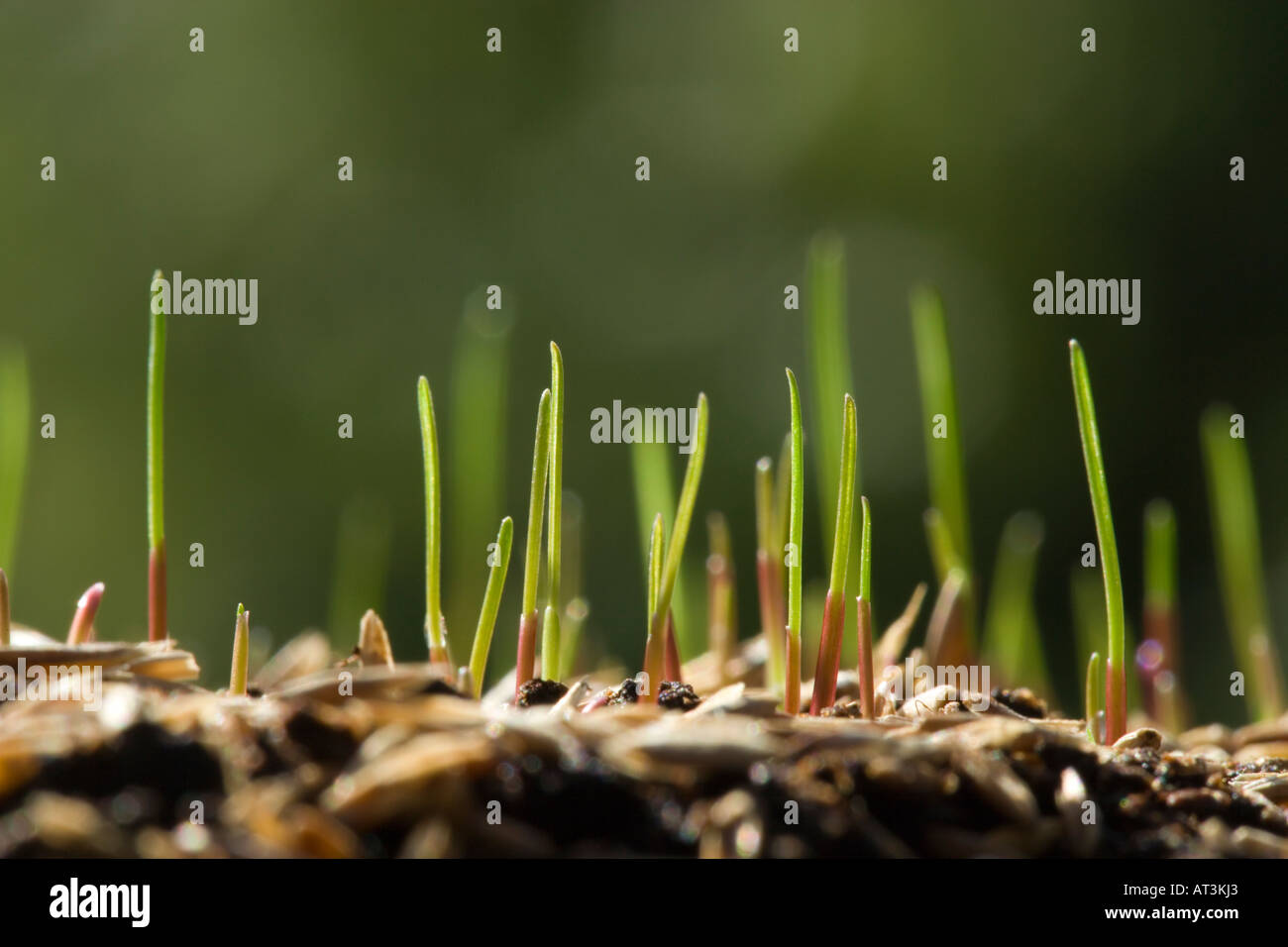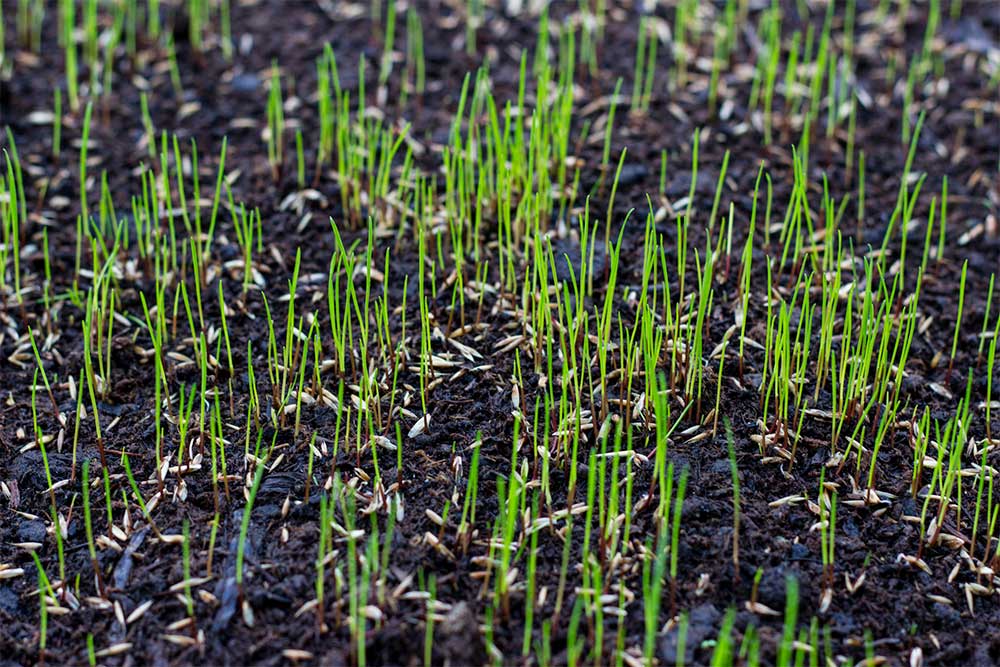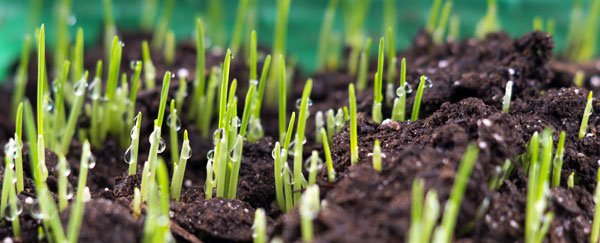Understanding the Grass Germination Process
Grass germination is a complex process that involves the activation of a seed, followed by the emergence of a seedling. The entire process, from seed activation to seedling establishment, can take anywhere from a few days to several weeks, depending on various factors. One of the most critical factors affecting grass germination is soil temperature. Different types of grass seeds have optimal temperature ranges for germination, and temperatures that are too high or too low can significantly delay or even prevent germination.
Soil moisture is another crucial factor that affects grass germination. Seeds need consistent moisture to germinate, but excessive water can lead to rot and poor germination rates. Light also plays a significant role in grass germination, with some seeds requiring light to germinate, while others prefer darkness. Understanding the specific needs of your grass seed type is essential to optimize the germination process.
The germination process itself involves three stages: seed activation, seedling emergence, and seedling establishment. During seed activation, the seed absorbs water, and the embryo begins to grow. In the seedling emergence stage, the seedling breaks through the soil surface, and the first leaves and roots begin to develop. Finally, during seedling establishment, the seedling develops a robust root system and grows its first set of true leaves.
While the exact time it takes for grass to germinate can vary depending on the factors mentioned above, most grass seeds germinate within 7-14 days. However, some types of grass, such as Kentucky bluegrass, can take up to 28 days to germinate. Understanding the specific germination time for your grass seed type can help you plan and prepare for optimal growth and establishment.
By understanding the grass germination process and the factors that affect it, you can take the first step towards creating an ideal environment for your grass to thrive. In the next section, we will discuss the various factors that influence grass germination time and provide tips on how to optimize these factors for faster germination.
Factors Affecting Grass Germination Time
Grass germination time can be influenced by a variety of factors, including soil type, temperature, watering, and sunlight. Understanding these factors and how to optimize them can help you achieve faster and more successful germination. Soil type, for example, can affect the rate of germination, with some soils providing better drainage and aeration than others. Sandy soils tend to drain quickly, while clay soils can be more prone to waterlogging, which can slow down germination.
Temperature is another critical factor that affects grass germination time. Different types of grass seeds have optimal temperature ranges for germination, and temperatures that are too high or too low can significantly delay or even prevent germination. For example, Kentucky bluegrass germinates best in temperatures between 60°F and 75°F (15°C and 24°C), while perennial ryegrass prefers temperatures between 50°F and 65°F (10°C and 18°C).
Watering is also essential for grass germination, but overwatering can be detrimental. Seeds need consistent moisture to germinate, but excessive water can lead to rot and poor germination rates. It’s essential to maintain a balance between keeping the soil moist and avoiding waterlogging. Sunlight is also crucial for grass germination, with most grass seeds requiring at least 6 hours of direct sunlight per day.
In addition to these factors, other environmental conditions, such as wind, humidity, and soil pH, can also impact grass germination time. Wind can disperse seeds, reducing germination rates, while high humidity can lead to fungal diseases that can prevent germination. Soil pH can also affect the availability of nutrients, which can impact germination rates.
By understanding the factors that affect grass germination time, you can take steps to optimize them and create an ideal environment for your grass to germinate. This may involve adjusting your watering schedule, providing supplemental lighting, or modifying your soil to improve drainage and aeration. In the next section, we will discuss how to create an ideal environment for grass germination, including tips on soil testing, fertilization, and aeration.
How to Create an Ideal Environment for Grass Germination
Creating an ideal environment for grass germination is crucial for successful growth and establishment. One of the most critical factors is soil preparation. Before sowing grass seeds, it’s essential to test the soil to determine its pH level and nutrient content. Based on the test results, you can adjust the soil by adding fertilizers or amendments to create a balanced and fertile environment for germination.
Fertilization is also a critical step in preparing the soil for grass germination. A balanced fertilizer with a mix of nitrogen, phosphorus, and potassium (NPK) can provide the necessary nutrients for seedling growth. However, it’s essential to avoid over-fertilizing, as this can damage the soil and prevent germination.
Aeration is another important step in preparing the soil for grass germination. Aerating the soil helps to improve drainage, reduce soil compaction, and promote healthy root growth. You can aerate the soil using a fork or a spiking tool, or by hiring a professional to do it for you.
Proper watering is also essential for grass germination. Seeds need consistent moisture to germinate, but overwatering can lead to rot and poor germination rates. It’s essential to maintain a balance between keeping the soil moist and avoiding waterlogging. A general rule of thumb is to water the soil lightly but frequently, keeping the top 1-2 inches of soil consistently moist.
Sunlight is also crucial for grass germination. Most grass seeds require at least 6 hours of direct sunlight per day to germinate. If your lawn receives partial shade, you may need to adjust the type of grass seed you use or provide supplemental lighting.
By following these steps, you can create an ideal environment for grass germination. Remember to test your soil, fertilize and aerate it, water it properly, and provide sufficient sunlight. With proper care and attention, your grass seeds will germinate and grow into a healthy and lush lawn.
Grass Seed Types and Their Germination Times
There are many types of grass seeds, each with its own unique characteristics, growth rates, and climate tolerance. Understanding the differences between these types can help you choose the best seed for your specific needs and climate. Here are some popular grass seed types and their germination times:
Kentucky bluegrass is a popular cool-season grass that germinates in 7-14 days. It is known for its dark green color, fine texture, and ability to tolerate shade. Perennial ryegrass is another popular cool-season grass that germinates in 3-7 days. It is known for its fast growth rate, fine texture, and ability to tolerate heavy foot traffic.
Tall fescue is a popular warm-season grass that germinates in 7-14 days. It is known for its deep green color, coarse texture, and ability to tolerate drought. Bermuda grass is a popular warm-season grass that germinates in 7-14 days. It is known for its fine texture, drought tolerance, and ability to thrive in full sun.
Other popular grass seed types include zoysia grass, buffalo grass, and bentgrass. Each of these types has its own unique characteristics, growth rates, and climate tolerance. By understanding the differences between these types, you can choose the best seed for your specific needs and climate.
In addition to the type of grass seed, the germination time can also be affected by factors such as soil temperature, moisture, and light. By providing optimal conditions for germination, you can help ensure that your grass seeds germinate and grow into a healthy and lush lawn.
When choosing a grass seed type, it’s essential to consider factors such as climate, soil type, and intended use. By selecting the right seed for your specific needs, you can help ensure that your lawn will thrive and require minimal maintenance.
How Long Does Grass Take to Germinate: A General Overview
The length of time it takes for grass to germinate can vary depending on several factors, including the type of grass seed, soil temperature, moisture, and light. Generally, most grass seeds germinate within 7-14 days, but some types can take up to 28 days or more to germinate.
Here is a general outline of the germination times for different types of grass seeds:
* Kentucky bluegrass: 7-14 days
* Perennial ryegrass: 3-7 days
* Tall fescue: 7-14 days
* Bermuda grass: 7-14 days
* Zoysia grass: 14-28 days
It’s essential to note that these are general estimates, and the actual germination time may vary depending on specific conditions. Factors such as soil temperature, moisture, and light can all impact the germination time of grass seeds.
In addition to the type of grass seed, the germination time can also be affected by the quality of the seed itself. High-quality seeds that are fresh and have a high germination rate will typically germinate faster than lower-quality seeds.
Understanding the germination time of your grass seeds can help you plan and prepare for optimal growth and establishment. By providing the right conditions and care, you can help ensure that your grass seeds germinate and grow into a healthy and lush lawn.
Troubleshooting Common Issues with Grass Germination
Despite proper care and attention, grass germination can sometimes be affected by common issues such as poor soil quality, inadequate watering, and pest or disease problems. Here are some troubleshooting tips to help you overcome these challenges:
Poor soil quality can be a major obstacle to grass germination. If your soil is heavy clay, sandy, or lacking in essential nutrients, it may be difficult for seeds to germinate. To overcome this, consider adding organic matter such as compost or manure to improve soil structure and fertility.
Inadequate watering is another common issue that can affect grass germination. If the soil is too dry, seeds may not germinate, while overwatering can lead to rot and poor germination rates. To avoid this, make sure to water your lawn deeply but infrequently to encourage deep root growth.
Pest or disease problems can also impact grass germination. Common pests such as white grubs, chinch bugs, and billbugs can feed on grass seeds, while diseases such as powdery mildew and rust can infect seedlings. To control these problems, use integrated pest management techniques such as cultural controls, biological controls, and chemical controls.
Other common issues that can affect grass germination include inadequate sunlight, poor soil pH, and compacted soil. To overcome these challenges, make sure to provide your lawn with adequate sunlight, adjust your soil pH to the optimal range for your grass type, and aerate your soil regularly to improve drainage and reduce compaction.
By troubleshooting common issues with grass germination, you can help ensure that your seeds germinate and grow into a healthy and lush lawn. Remember to monitor your lawn regularly, identify potential problems early, and take corrective action to prevent them from becoming major issues.
Optimizing Grass Germination with Proper Lawn Care
Proper lawn care practices are essential for promoting healthy grass growth and germination. By following a few simple tips, you can help create an ideal environment for your grass to thrive.
Mowing is an essential part of lawn care, and it can have a significant impact on grass germination. When mowing, make sure to maintain a height of 2.5-3 inches to promote deep root growth and prevent weed growth. It’s also essential to use a sharp mower blade to prevent tearing the grass and creating an entry point for diseases.
Fertilizing is another critical aspect of lawn care. By providing your grass with the necessary nutrients, you can promote healthy growth and germination. Use a balanced fertilizer that contains nitrogen, phosphorus, and potassium (NPK) to provide your grass with the necessary nutrients.
Pest control is also essential for promoting healthy grass growth and germination. Common pests such as white grubs, chinch bugs, and billbugs can feed on grass seeds and prevent germination. Use integrated pest management techniques such as cultural controls, biological controls, and chemical controls to manage pest populations.
Proper watering is also essential for promoting healthy grass growth and germination. Make sure to water your lawn deeply but infrequently to encourage deep root growth. Avoid overwatering, which can lead to shallow root growth and create an environment conducive to disease and pest growth.
By following these simple lawn care tips, you can help create an ideal environment for your grass to germinate and grow. Remember to maintain a consistent mowing schedule, fertilize regularly, control pests, and water properly to promote healthy grass growth and germination.
Conclusion: Giving Your Grass the Best Chance to Thrive
In conclusion, understanding the grass germination process is crucial for creating an ideal environment for your grass to thrive. By understanding the factors that affect grass germination, such as soil temperature, moisture, and light, you can take steps to optimize these factors for faster germination.
Additionally, proper lawn care practices, including mowing, fertilizing, and pest control, are essential for promoting healthy grass growth and germination. By following these tips and creating an ideal environment, you can give your grass the best chance to thrive.
Remember, grass germination is a complex process that requires patience, attention to detail, and a willingness to learn. By following the tips and guidelines outlined in this article, you can improve your chances of success and create a lush, healthy lawn that will thrive for years to come.
Whether you’re a seasoned gardener or a beginner, understanding the grass germination process is essential for creating a beautiful and healthy lawn. By taking the time to learn about the factors that affect grass germination and how to optimize them, you can create an ideal environment for your grass to thrive.
In the end, the key to successful grass germination is to provide your grass with the right conditions and care. By following the tips and guidelines outlined in this article, you can give your grass the best chance to thrive and create a beautiful, healthy lawn that will be the envy of your neighbors.








